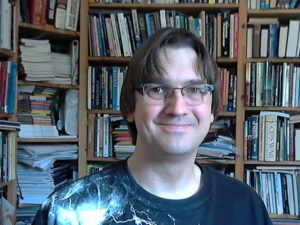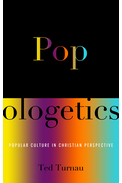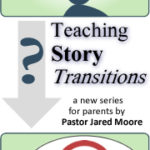Why Christians Can Love Speculative Stories
 Before I launch into a reasoned, seasoned defense of speculative fiction, a little truth-in-advertising: I am a sci-fi/fantasy geek. Not the hard-core, dress-up-as-a-storm-trooper-at-Comicon type of geek. But from my earliest memories as an independent reader (that would be after the stage where my mother read Winnie the Pooh and The Odyssey to my brother and me, but before, say, grad school), I have nurtured a deep and abiding love for fictional worlds that are radically different from my own.
Before I launch into a reasoned, seasoned defense of speculative fiction, a little truth-in-advertising: I am a sci-fi/fantasy geek. Not the hard-core, dress-up-as-a-storm-trooper-at-Comicon type of geek. But from my earliest memories as an independent reader (that would be after the stage where my mother read Winnie the Pooh and The Odyssey to my brother and me, but before, say, grad school), I have nurtured a deep and abiding love for fictional worlds that are radically different from my own.
After I had conquered Ramona the Brave and the other Beverly Cleary books in 6th and 7th grade (I had a slow start as an independent reader), I remember plowing straight into the Penguin Classics 2 volume edition of Le Mort D’Arthur by Sir Thomas Malory. I spent hours with Ged traveling to the edge of Earthsea in Ursula Le Guin’s trilogy (it’s a quartet now). Ray Bradbury’s Martian Chronicles and Something Wicked This Way Comes warmed my heart and chilled my soul. Arthur C. Clarke, Isaac Asimov, Robert Heinlein, Frank Herbert, Stephen R. Donaldson, I loved them all. And worse, I was an avid, no, rabid RPG gamer (mostly Advanced Dungeons and Dragons, but also I remember putting quite a lot of time into an obscure post-apocalyptic RPG called Aftermath!).
So when I say sci-fi/fantasy geek, I do have some street cred.

“I Wish I Could Open My Chest and Let the Snow Come In,” 2010, acrylic watercolor by the author’s daughter, Claire Elise Turnau, when she was 15.
So perhaps it will come as no surprise that someone like me would weigh in heavily on the side of speculative fiction. But why? Why do we love them so? Why are these fantastic worlds so magnetic? What do we find there? And what does this tell us about how Christians are to relate to culture, especially literary culture?
There are some Christians who believe that there is nothing of value to be found in speculative fiction. Though not as common an attitude as it used to be (thanks in no small part to Lewis and Tolkien, the canonized saints of Christian literature), you can still find a deep bias against science-fiction and fantasy. It’s not, you see, real literature. That is, it is not the kind of literature you’d find in The New Yorker, not populated by wan, nihilistic upper-middle class people with failing marriages and self-destructive tendencies.
In the late 1990s, the British bookstore Waterstone’s, the BBC, Nestlé, and several British newspapers ran a series of polls of the reading public in Great Britain. They asked them who they thought was the most influential (or their favorite) author of the century. Tolkien placed first in nearly all of the polls, coming in second only in the Nestlé poll, and that was to the Bible.1 There was, predictably, much snarling and gnashing of teeth among academics about the waning influence of “proper literature” (Christians among them). How could a silly book filled with elves and dwarves be considered true literature? Is not such fiction simply escapist? Does it not simply serve as a way of avoiding the real world?
So here, in brief, is my reply about why speculative fiction is worth loving, even (especially) as a Christian.
First, speculative fiction gives the writer much more space to work in.
Some speculative fiction is utopian: it envisions a bright future of realized possibilities. Some is dystopian: it envisions a dark future of dashed hopes and dreams. And some is, for lack of a better word, paratopian: it envisions a world that isn’t necessarily better or worse, but different, with different rules, different cultural cues, different outcomes.
But the surprising thing about this increased space for storytelling is all the worlds end up populated with people. Not necessarily human beings. They could be aliens, or animals, or floating orbs of light. But they are all, to some extent, anthropomorphized. They are human beings spun different. And that is telling. As a Christian, this tells me that our shared humanity, our shared image of God, runs deep. So deep, in fact, that it can never quite be shook off. And that makes fiction of any kind a sort of moral and spiritual laboratory, as literary theorist Paul Ricoeur noted.2
In fact, it seems to me that speculative fiction’s increased space for storytelling makes it more effective as a moral and spiritual laboratory than the cramped quarters of “realistic fiction.” Just as a hadron collider needs miles and miles of territory to get really interesting results, the space afforded by speculative fiction allows authors and readers to explore imaginative territory not otherwise available. And if learning something about human nature is one of the reasons we create and read literature (and one of the chief reasons Christians should be interested in literature), then speculative fiction can do that at least as well, if not better, than more conventional modes of storytelling. The elf or alien may uncover human reality better than the Wall Street banker.
Second, the imaginative worlds of speculative fiction are enchanting. And that is no small thing.
The whole purpose of storytelling is to project imaginative worlds that invite the reader to come and dwell there, to learn to live and breathe and see and feel as an-other. And for my money, the more “other” the better!
This is not (simply) escapism. Rather, the very otherness of speculative fiction is a marker, a pointer to a simple fact about reality that often remains obscured in realistic fiction: the quotidian is not all there is.
The post-Enlightenment West has spread the myth far and wide that the physical world is all, and that the totality of what we may expect out of life is work, food, money, shelter, sex, vacations, and death. This is a lie, a demonic reduction of human life to its most mundane and trivial. We were made for so much more. We were made for glory, for basking in the reflected light of grandeur. Is it any wonder, then, why we gravitate towards epic narratives full of magic (whether wizardly or technological), full of heroism, full of ultimate significance?

Ted Turnau in Popologetics: “Popular culture, like any other facet of society, is a messy mixture of both grace and idolatry, and it deserves our serious attention and discernment.”
If our stories deny this in order to maintain the standard, fashionable bland atheism/nihilism, that hipness-unto-death that counts as “realism” in fiction, who then is truly being escapist? Give me otherness, give me magic swords and sorcery and aliens and ray guns and unleashed hope and terror that reaches beyond the bounds of this world. But don’t call it “escapism.” Call it, rather, a reminder of the real. Not all otherness is spiritually enriching, of course, but otherness as such (the very thing that offends the defenders of real literature) is a necessary ingredient for the Christian imagination. It reminds us of our true home, of the true nature of the battles we fight, of the victory we hope for.
There are probably other reasons I could adduce (not least of which would be the “Dr. Seuss Defense,” namely, that “These things are fun, and fun is good”).3 But I think these two – the space given to explore human nature, and the resonance of otherness – should suffice. Christians should not be ashamed to engage in flights of fancy, to enjoy fantastic worlds. In so doing, we can learn about ourselves, and remember our true home.
- Tom Shippley, J. R. R. Tolkien: Author of the Century (London: Harper Collins, 2000), xx-xxi. Tolkien also missed the top honor in the Waterstone’s poll in Wales, being beaten by James Joyce’s Ulysses. ↩
- Paul Ricoeur, Oneself as Another, transl. by Kathleen Blamey (Chicago: University of Chicago Press, 1992), 164. ↩
- Dr. Seuss (Theodore Geisel), One Fish, Two Fish, Red Fish, Blue Fish (New York: Random House, 1960), 51. ↩








































A hearty amen from this corner!
[…] much like the fiction that we read or watch. They’re all the mind’s flight simulator, or like our moral and spiritual testing laboratory. We are testing our decisions to see whether they will lead to a better […]